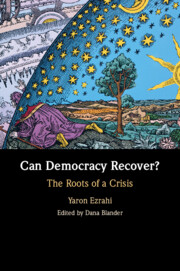Book contents
- Can Democracy Recover?
- Can Democracy Recover?
- Copyright page
- Dedication
- Contents
- Preface
- Words from the Author
- Introduction
- Part I The Rise of Western Politics following the Collapse of the Monistic Medieval Cosmology
- Part II The Emergence of the Epistemological Constitution of Modern Democracy
- Part III The Dialectics of Objectification
- Part IV The Erosion of the Epistemological Constitution of Modern Democracy
- Part V Democracy beyond Modernity
- Can Democracy Recover? Concluding Reflections
- Epilogue
- Index
Can Democracy Recover? Concluding Reflections
Published online by Cambridge University Press: 02 January 2025
- Can Democracy Recover?
- Can Democracy Recover?
- Copyright page
- Dedication
- Contents
- Preface
- Words from the Author
- Introduction
- Part I The Rise of Western Politics following the Collapse of the Monistic Medieval Cosmology
- Part II The Emergence of the Epistemological Constitution of Modern Democracy
- Part III The Dialectics of Objectification
- Part IV The Erosion of the Epistemological Constitution of Modern Democracy
- Part V Democracy beyond Modernity
- Can Democracy Recover? Concluding Reflections
- Epilogue
- Index
Summary
The Concluding Reflections explore democracy’s potential to overcome its contradictions and challenges. The rise of populism, seen as democratic autoimmunity, is examined, where leaders manipulate public sentiment, often through xenophobia and anti-elitism, undermining democratic principles. The tyranny of an exclusory majority is also cautioned against. The potential for democracy’s reimagining in the face of contemporary challenges such as cybernetic culture, migration, and globalization is considered. Ezrahi reflects on the role of creative individuals and cultural forces in shaping political imaginaries. The transformation of the internet and major platforms like Google, Facebook, Amazon, and Twitter from democratizing communication to powerful monopolies is analyzed, as well as the misuse of Big Data, illustrated by the Cambridge Analytica scandal, and the unintended consequences of digital platforms, including the spread of misinformation. The discussion concludes with a reflection on the broader deterioration of democratic epistemology. Ezrahi argues for a shift from a positivistic, naturalistic ontology to an ethical-normative anchorage, proposing to replace the current ontological defense of democracy with a commitment to preserving freedom based on novel axioms, framing politics as alternative productive fictions. Ezrahi proposes to reimagine a democratic epistemology which is anchored in ethics and collective commitment.
Keywords
- Type
- Chapter
- Information
- Can Democracy Recover?The Roots of a Crisis, pp. 192 - 212Publisher: Cambridge University PressPrint publication year: 2025

